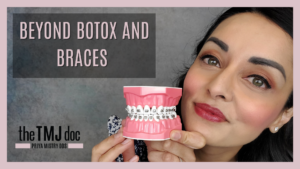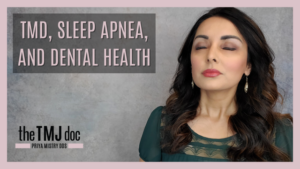Dr. Priya Mistry, widely recognized as “The TMJ Doc,” often addresses the intricate relationship between sleep apnea and teeth clenching (bruxism). While many people associate bruxism with stress or anxiety, sleep apnea—a condition characterized by pauses in breathing during sleep—is an often-overlooked contributor. Let’s explore how sleep apnea can lead to clenching and grinding and why addressing both issues is vital for overall health.
1. What Is Sleep Apnea?
Sleep apnea is a sleep disorder in which breathing repeatedly stops and starts due to airway obstruction (obstructive sleep apnea) or miscommunication between the brain and breathing muscles (central sleep apnea).
Common symptoms include:
- Loud snoring
- Daytime fatigue
- Interrupted sleep
These breathing disruptions can have far-reaching effects on the body, including the tendency to clench and grind teeth.
2. The Connection Between Sleep Apnea and Bruxism
Research has shown a strong correlation between sleep apnea and nocturnal bruxism.
Here’s how the two conditions are linked:
- Airway Obstruction and Jaw Response: When the airway becomes blocked during sleep, the brain sends a signal to reopen it. This often involves tightening the jaw muscles, which can result in clenching or grinding.
- Increased Stress on the Body: Sleep apnea triggers the release of stress hormones like cortisol, which can heighten muscle tension and contribute to bruxism.
- Fragmented Sleep: Frequent awakenings caused by apnea episodes can lead to disrupted sleep cycles, increasing the likelihood of bruxism during lighter stages of sleep.
3. Signs of Clenching and Grinding Linked to Sleep Apnea
Patients with both conditions often exhibit the following symptoms:
- Worn-down or chipped teeth
- Jaw pain or stiffness upon waking
- Headaches, particularly in the temples
- Increased tooth sensitivity
Dr. Mistry emphasizes that these signs shouldn’t be ignored, as they can indicate underlying sleep apnea and related health risks.
4. The Importance of Addressing Both Conditions
Treating one condition without addressing the other can lead to incomplete relief. Here’s why:
- Unmanaged Bruxism: Ignoring bruxism can result in long-term damage to teeth, gums, and the temporomandibular joint (TMJ).
- Untreated Sleep Apnea: Failing to address sleep apnea can lead to serious health problems, including high blood pressure, heart disease, and cognitive issues.
Dr. Mistry’s approach involves tackling the root causes of both conditions to ensure comprehensive care.
5. How Dr. Mistry Can Help
Dr. Priya Mistry diagnoses and treats TMJ disorders and related conditions.
Her comprehensive care includes:
- Custom Oral Appliances: These devices can reposition the jaw to improve airway flow and reduce clenching.
- TScan/DTR Therapy: Measuring the bite and muscle activity
- Stress Management and Muscle Relaxation Techniques: Addressing contributing factors like stress can help alleviate bruxism.
Final Thoughts
The link between sleep apnea and teeth clenching highlights the interconnectedness of the body’s systems. By addressing both conditions simultaneously, patients can achieve better sleep, reduced pain, and improved overall health. Dr. Priya Mistry is dedicated to helping patients uncover and resolve the root causes of their symptoms. If you suspect sleep apnea or bruxism may be affecting your health, schedule a consultation today to take the first step toward lasting relief.







